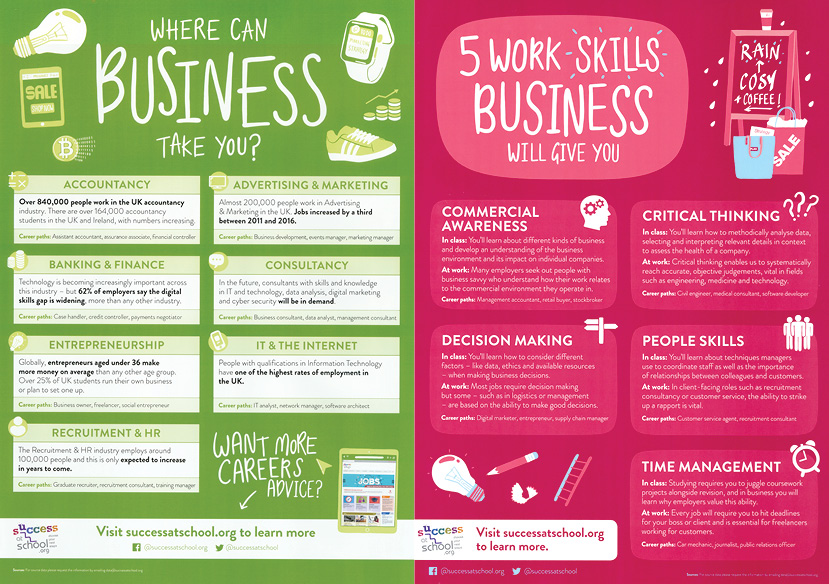Business

Business Studies – A Level
Qualifications to start the course
Minimum entry requirements for all A-Level courses are a minimum of 8 GCSE subjects, with an average grade of 6 (legacy grade B) or above, including at least a grade 6 or above in GCSE English Language (or Literature) and GCSE mathematics and a grade 6 or above in GCSE Science.
To study this subject, you will also need a grade 6 or above in GCSE English Language.
Description of the subject
This course is particularly suitable for any student with an enquiring and analytical mind who takes a keen interest in the way the wider economy and the dynamic business world operates.
Students will develop the knowledge and skills needed to analyse data, think critically about issues and make informed decisions – all skills that are needed for further study and employment. You will study business in a variety of contexts (e.g. large/ small; UK/global; service/manufacturing) and consider:
- The importance of the context of business in relation to decision making
- The interrelated nature of business activities and how they affect competitiveness
- The competitive environment and the markets in which businesses operate
- The influences on functional decisions and plans including ethical and environmental influences
- The factors that might determine whether a decision is successful (e.g. quality of data and degree of uncertainty)
- How technology is changing the way decisions are made and how businesses operate and compete
- The impact of stakeholders of functional decisions and their response to such decisions
- Use of non-qualitative and quantitative data in decision making (including interpretation of index numbers and calculations such as ratios and percentages)
What you will do
| Paper 1: Business 1 | + | Paper 2: Business 2 |
| What’s assessed
1-6 and above |
What’s assessed
1-6 and above |
|
Assessed
|
Assessed
|
|
| Questions
Three compulsory sections:
|
Questions
One compulsory case study consisting of approximately seven questions |
| Paper 1: Business 1 | + | Paper 2: Business 2 | + | Paper 3: Business 3 |
| What’s assessed
All content above |
What’s assessed
All content above |
What’s assessed
All content above |
||
Assessed
|
Assessed
|
Assessed
|
||
| Questions
Three compulsory sections:
|
Questions
Three data response compulsory questions worth approximately 33 marks each and made up of three or four part questions. |
Questions
One compulsory case study followed by approximately six questions |
Before the qualification can be awarded, students must undertake all of the assessments above.
Future prospects
Careers in Business (Marketing, Operations, Finance or Human Resources) and the opportunity to set up your own small private enterprise.

Business Studies - BTEC Level 3
Qualifications to start the course
Students must have five GCSEs including English, Mathematics and Science graded A* – C.
Description of the subject
This is a vocationally related qualification. It provides knowledge of business activity and helps to develop skills commonly required in business organisations. Students will complete 13 units over two years. The qualification is equivalent to three A Levels, at A – C therefore successful students will obtain a triple award (e.g. PPP, MMM, DDD, DDD*).
What you will do
This course consists of 13 units in total and is equivalent to three A-levels. Grading system is Pass, Merit, and Distinction; there are 7 mandatory units and 6 optional.
Mandatory units are as follows (*= exam assessed units):
- Exploring Business
- Developing a Marketing Campaign*
- Personal and Business Finance*
- Managing an Event
- International Business
- Principles of Management*
- Business Decision Making (synoptic)*
Optional units:
- Recruitment and selection process
- Team building in Business
- Investigating Customer Service
- Creative Promotion
- Pitching for a new Business
- Market Research
Future prospects
Higher Education in business or management.
Accountancy, Business Finance, Law, Retail. There are many organisations seeking to employ people with business knowledge and skills. Insight into setting up your own small private enterprise.




